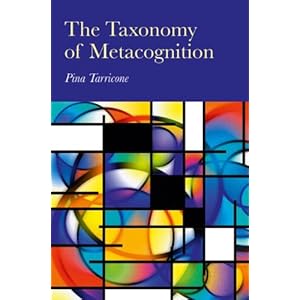I see the process of metacognition come on line frequently in IM. This week, a mom of an 8 yr old going through IM a second time commented that her son was beginning to get some 'insight into himself.' I understood this comment to mean that his ability to think about his own thoughts had started to come on line more, metacognition. Dr. McGrew recently posted about metacognition and linked to an entire book about to be published about that mental process.
Here are a few quotes from that book.
`Meta' is a Greek word meaning after, behind or beyond (Zechmeister and
Nyberg, 1982). Why is `meta' added to .. metacognition? This has been done to signify a
change in emphasis to `knowledge about one's own cognition rather than
the cognitions themselves' (Brown, 1978, p. 79)
The problem with the term is that it is difficult to distinguish clearly
between what is meta and what is cognition. Generally, the main distinction between the two is that
cognition is a `constant flow of information' (Langford, 1986) and
metacognition is knowledge and awareness of processes and the monitoring
and control of such knowledge and processes. The main distinction between
cognition and metacognition is that metacognition is considered to be
`second-order cognitions' (Kuhn, 2000a; Weinert, 1987).
Many researchers `eschew [the] rigid or operational definitions' that
are available and prefer to refer to metacognition as `thinking-about-
thinking' and `cognitive judgments about . . . cognitive states and abilities'
(Paris and Winograd, 1990, p. 16). Other simplistic descriptions include
`mental mirroring' (Antaki and Lewis, 1986; Langford, 1986); `thoughts
about cognition' (Yussen, 1985); `thinking your own thinking'; `reactions
on cognition' (Schoenfeld, 1987); `thinking about thinking' (Babbs and
Moe, 1983; Yussen, 1985) and `cognition about cognition' (Georghiades,
2004; Kluwe, 1982; Wellman, 1985a).
So, as you can see, if you want to go deeper into this ability that IM often helps, there are people that heavily study and define this intricate mental process. Metacognition functionally impacts an individuals life dramatically. Without the ability to metacognate, individuals miss out on so much of the fullness of life. They react to the environment but have little ability to analyze their own role in it. Nor can they consciously think, act and change accordingly. I love it when I hear a parent describe metacognition coming on line. I know this child now will have a much richer life, forever. My son Brad's metacognition ability came on line at age 17 about half way through basic IM training, but for many students that I see, it's the second, third or forth group of 15 IM sessions that metacognition comes on line.
